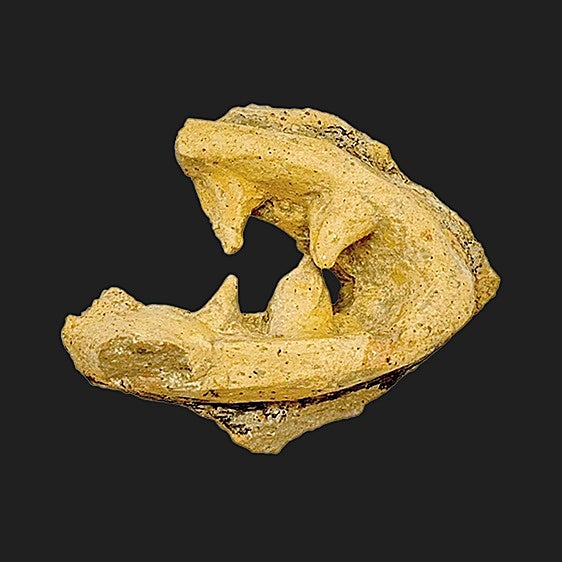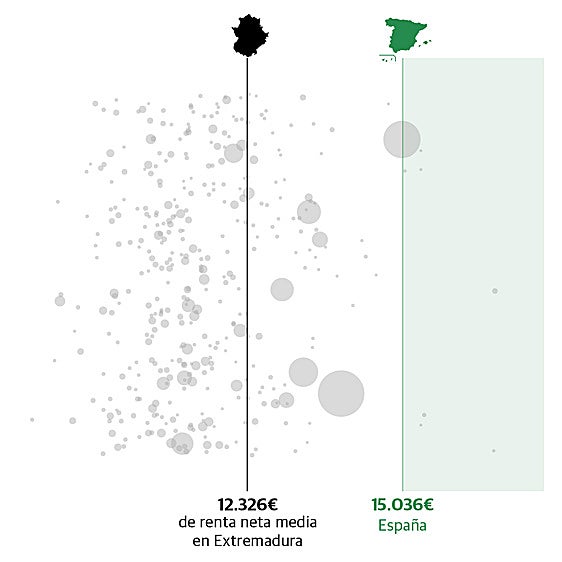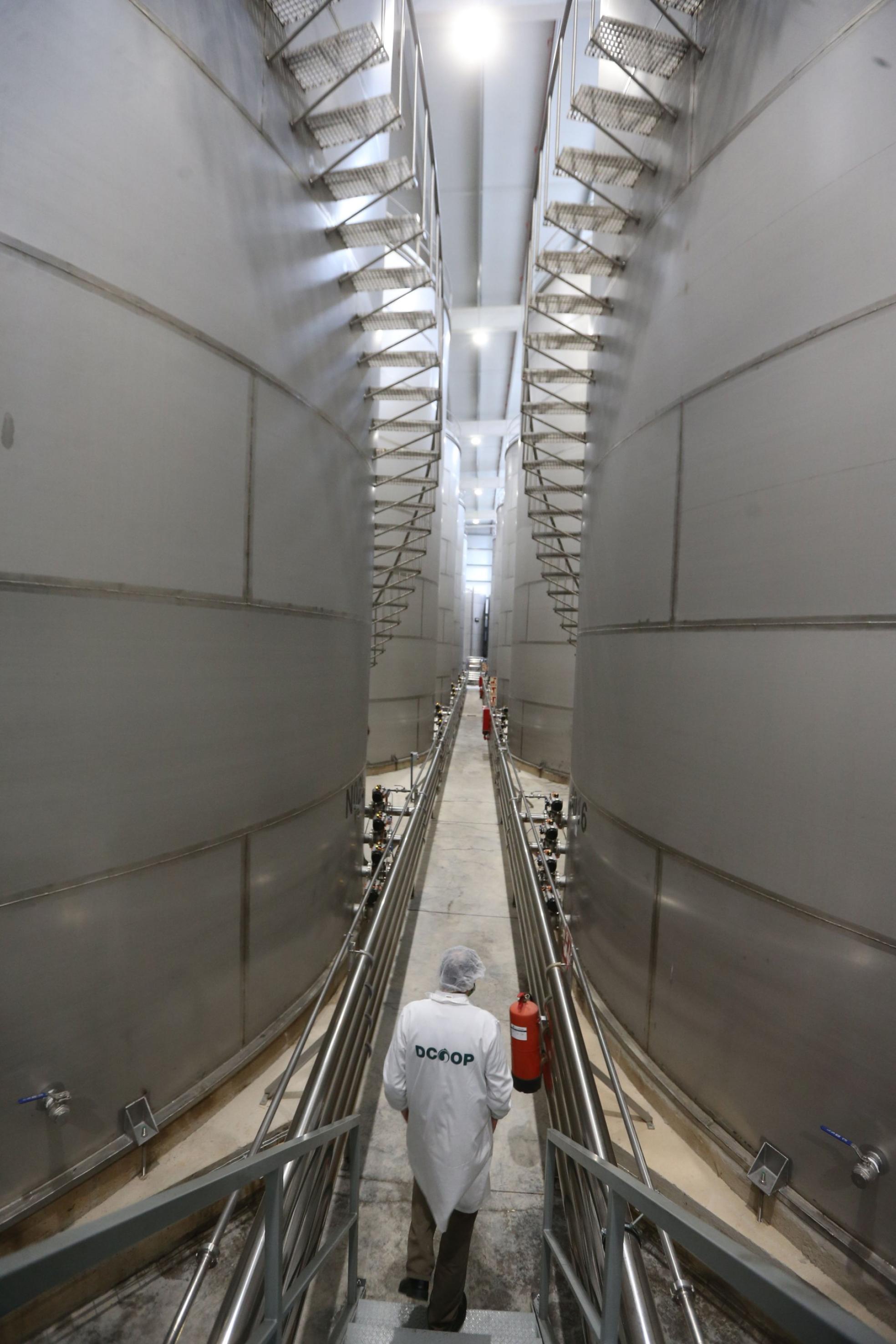A day at the heart of Dcoop
The cooperative in Antequera sells olive oil in 79 countries. Tradition and culture combine with industry 4.0
MATÍAS STUBER
Friday, 21 January 2022, 12:46
Not a day passes in Pilar Palacios' life without olive oil. She pours it on her toast, uses it to dress her salads, fries eggs in it and puts it in her cake mix. "No, I have never gone off it," she says, although she admits that that even surprises her sometimes. "Did you know, the Japanese like to put it on their skin and on small wounds?" she asks us. She now pours four different types of oil into small blue-coloured glasses and she labels each with a number. She then produces a plastic box with pieces of apple inside and invites her visitors to eat one. "It's to neutralise the taste," she explains.
One could say that Pilar is in charge of flavour at Dcoop. She is the quality control manager in the laboratory of one of the biggest agri-food cooperatives in the world. If the oil is liquid gold then this, in Antequera, is the start of a fertile road which transports the liquid gold to 79 other countries including destinations with such exotic names as French Polynesia, Alaska and Nigeria. In terms of turnover, the company ended 2020 with 907.7 million euros in sales.
Pilar Palacios takes the first glass and moves it gently so the flower can develop. Then she rotates it using circular movements with her hand. Now she brings the glass to her mouth to sample it. It is obvious that she is not in a rush to swallow it. She uses her tongue so that it spreads to the whole of her mouth. "What determines whether an oil is good is the fruitiness," she explains.
They stand in rows like an army, or pearls strung on a necklace. There is nothing but olive trees as far as the eye can see, as you drive up the road that leads you to Dcoop. Some have been there for 500 years.
The fruitiness of an olive oil is measured by its intensity, which is nothing more than the aromas which accompany it. The more complex it is, the more it reminds you of other well-known flavours. Grass, tomato or almonds, for example. The balance between bitterness and spiciness is also important. The colour has a strong influence on the brain. That is why the oil is tasted from blue containers, so all the samples appear to be the same colour. "We Andalusians like oil to be green, and Asians normally prefer it to be yellow," she explains.
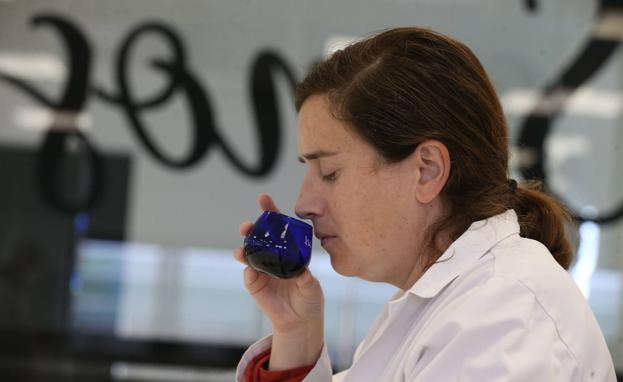
There is a strong cultural influence on the consumption of olive oil and there are three types of classification, depending on the quality: extra virgin, virgin and lampante (refined).
"Here we normally use extra virgin for everything but in villages in Castilla, for example, they have no problem in having virgin oil for breakfast. Lampante is no good for eating," says Pilar, pulling a face to indicate that it tastes rancid.
The road to the Dcoop headquarters is exactly as you imagine it might be. Coming from Malaga, after taking the exit from the motorway, you come on to a stretch of road where all you can see are long straight lines as far as the horizon.
They stand in rows like an army. Like pearls strung on a necklace. Nothing but olive trees as far as the eye can see. Some of these veterans have been here for more than 500 years.
A building stretches up to a height of 32 metres and on the top, in big green letters, is the word Dcoop. The second 'o' is in the shape of an olive. Grey clouds hang in the sky and the grey atmosphere makes the foliage of the olive plantations stand out even more. It is like a dream in silver and green. The olives, plump as they always are in the winter months, hang from the branches in groups of bluish black.
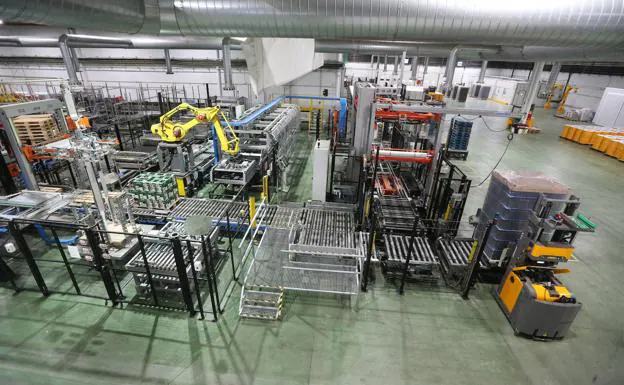
Phoenician traders brought the first olive trees from the Middle East and Greece to Andalucía many centuries before Christ. During the Roman period the region became the biggest producer of olives. Under Moorish rule, from the year 800 to more or less 1400, the cultivation of olive trees was perfected. The words 'aceite' and 'aceite de oliva' (oil and olive oil) come from Arabic.
The olive tree, a symbol of peace and immortality, was eulogised by such illustrious individuals as Homer and Sophocles. There are other examples, too. In ancient times, Olympic winners were crowned with olive branches. In the Old Testament, the dove brought an olive twig to Noah's ark as a sign of new life after the great flood.
Dcoop functions rather like an ark that brings hope for farmers all over Andalucía. This is where the product from more than 100 mills is distributed all over the world. Dcoop is a second-tier cooperative and it manages the work of 75,000 farmers and stockbreeders. Although olives and olive oil are the pillar of the business, it also operates in the sector of wine, cereal, nut, meat and, also, the supply sector. The cooperative is the result of a fusion between two companies in 2005: Aceitunas de Mesa de Córdoba and Hojiblanca.
Esteban Carneros grew up surrounded by olives. His father and grandfather were both farmers. When he was a boy, he used to help harvest the olives and he recalls how his hands used to freeze in the cold as they worked during the months of November and December. Now he is Dcoop's director of institutional relations and he accompanies us on this tour of the headquarters of this giant in the agri-food sector. There are several buildings on this vast terrain, and two of them stand out from the rest.
In one there are 64 enormous tanks, where the oil that arrives in tanker lorries from the mills is stored. The other is a modern plant where the product is packed before being exported in different sizes to 79 countries. "We also send oil in bulk for packaging in the plants we have in other countries," says Carneros, but he explains that the format which sells most is the one-litre bottle.
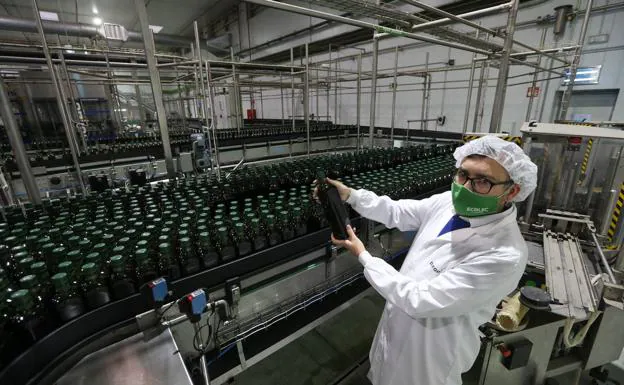
The packaging plant was inaugurated in 2009 and a walk round it evokes a sensation of a factory of the future. The cleanliness is impressive. Any mother would be proud if their son's room was one quarter as clean as the floor of this plant.
Instead of a lot of workers, what you see between the conveyor belt of bottles that pass through different phases from filling, labelling to packaging, is highly robotised machinery. Telecommunications, GPS and industrial processes all merged into one. "Industry 4.0", the word which is in fashion among engineering students, is obvious to someone who is watching how three machines move around the facilities autonomously and load the pallets which are then transported to the next-door store, with no need for a driver.
Dcoop works with the JIT (Just In Time) process, which means that things are packed in response to an order. "We try to avoid building up large stocks," says Carneros, and he stresses the importance that the cooperative has gained in the foreign market in recent years.
Dcoop's balance sheets show that around 50 per cent of its 907.7 million euro turnover was from abroad. The countries the group exported to the most in 2020 were the USA, Italy, France, Germany, the UK, Japan and Portugal, in that order.
It is still cloudy in Antequera and Pilar Palacios carries on tasting oils in order to maintain the quality of the product. The golden road is still asphalted, to make sure the liquid gold reaches even the most remote destinations. Dcoop, a cooperative from Antequera to the world.
